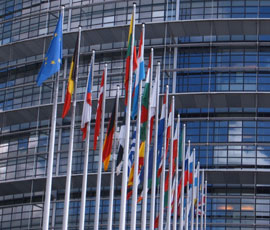EU leaders in crunch talks over CAP budget

European leaders are gathering in Brussels today (Thursday) to try to hammer out an agreement on the EU budget that will also determine the future of the Common Agricultural Policy.
The CAP accounts for more than 40% of the entire EU budget and under single farm payments UK farmers currently receive about £230/ha for maintaining land in cultivatable condition.
But DEFRA insisted that when governments across Europe needed to reduce their deficits, it was essential that EU spending was also restrained and no sector, including agriculture, could be exempted.
“We want significant reform of the CAP so that over time, production across Europe is not reliant on direct subsidies and farming can take advantage of the huge opportunities for export, particularly to developing markets,” said a DEFRA spokesman.
“While we want farm spending to be reduced overall in the long term, we want to build on the strong track record the UK has for rewarding farmers for providing good environmental outcomes and improving wildlife.”
However, ahead of the crunch two-day summit, farming leaders across Europe warned that cuts to the CAP could risk farmers’ jobs and threaten food security. The NFU said it was “vehemently opposed” to plans to grant powers to cut funds at national level.
NFU director of policy Martin Haworth said the union expected the UK government to treat its farmers equitably so they can operate on a “level-playing field” with their main competitors in Europe.
“We have said all along that it would be unrealistic for us to expect the CAP to be exempt from the austerity measures that are being applied throughout the European Union,” said Mr Haworth.
“What is key to us is that whatever settlement is finally reached, the terms and conditions applied to our farmers must not put us at a disadvantage with our major competitors.”
The NFU said it remained “deeply concerned” that the UK government was continuing to negotiate powers to remove 20% of farmers’ direct payments and push it into rural development funds.
“This would hit our farmers far harder than any cuts that are applied fairly and equally across all European farmers,” said Mr Haworth.
The centrepiece of the CAP reform remains the “greening” of direct payments, he said. And Mr Haworth said farmers must be given greater flexibility to implement environmental measures in the most cost-effective way to suit their farms.
“If the budget is reduced, it’s only right that the conditions and costs imposed on farmers should also be reduced,” he added.
EU farmers’ organisation Copa-Cogeca called on heads of state and governments to agree a strong CAP, backed by a strong EU budget.
Further spending cuts would threaten food security and growth and employment in EU rural areas, the organisation warned.
Copa-Cogeca president Gerd Sonnleitner said: “The current CAP costs less than 1% of the total EU public expenditure. In return it provides the EU’s 500 million citizens with huge benefits.
“It provides consumers with a choice of safe, secure, quality food supplied at affordable prices and ensures employment for 26 million people on farms and 10 million in related sectors, mostly in the EU rural areas.”
The 27 European leaders could not reach an agreement over the EU budget when they met in November. However, if an agreement on the budget can be reached this week, it is hoped that Ireland, which holds the EU presidency, can finalise a CAP deal by the end of June, which will frame the post-2015 CAP agenda.
